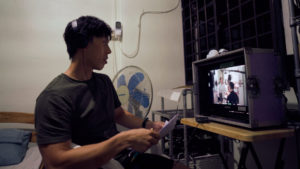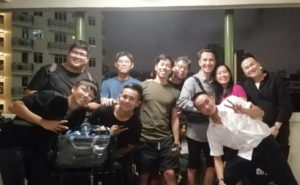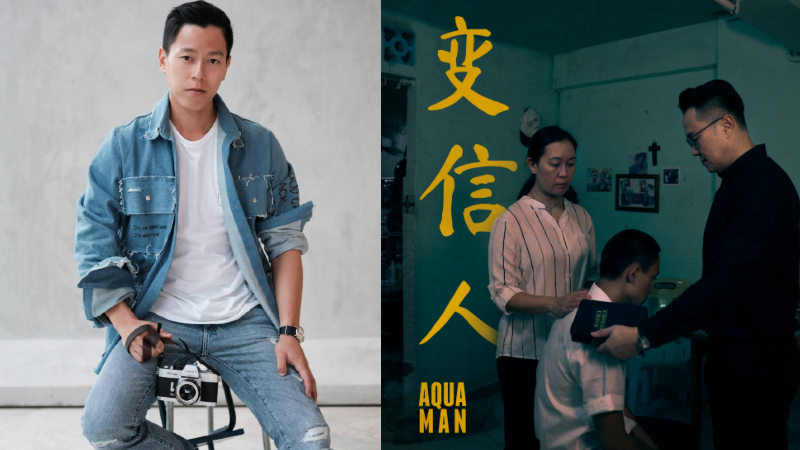Making movies about lesbian, gay, bisexual, and transgender can be daunting under Singapore’s restrictive censorship laws, but that didn’t stop one filmmaker from doing so in his directorial debut. Getting his work to the big screen, however, was a whole other obstacle to overcome.
It only took one month for Jet Ho to conceptualize, write, cast and film Aqua Man, a short film about a young Singaporean boy that looks at the hot-button topic of gay conversion therapy. But that was just the beginning of his struggle for anyone to see it. Because it touches the media third rail of homosexuality, his story of student Jun Jie, his distressed mom, and Bible-armed pastor was rejected at least 15 times, by Ho’s count, by streaming platforms and film festivals.
“It [was] quite fast to film, but it took me a very hard time to promote the film,” Ho told Coconuts. “It basically was rejected everywhere from the start until I decided to just launch it on YouTube and give it some justice to itself.”
Censorship, gay conversion therapy, and making films that matter, with Aqua Man director Jet Ho
There’s no Jason Momoa here coming to the rescue, so why Aqua Man? Aqua sounds similar to a derogatory Hokkien term for gay men, Ah Kua, which literally means transvestite. In Ho’s film, actor Josh Lim is the titular character, who comes home one day to find his mother has brought a pastor to pray the gay out of him with a praying ritual form of conversion therapy.
It’s a timely topic as Singaporeans clash over extending or suppressing LGBT rights and recognition in an uneven struggle that has seen one side given a voice over the other.
Because of the subject matter, Aqua Man could never be shown on television, as films featuring characters who are gay – an “alternative sexuality” to government censors – is automatically rated 21 and up.
That restriction, most often applied to movies containing nudity, was not something Ho was OK with. After all, he wanted to reach those who would most identify with his protagonist.
“It is a societal problem that starts out even with kids at a very young age,” Ho said, referring to the younger generation who struggle with their sexual identity. “This has got nothing to do with explicit pornographic material, that perhaps needs a higher age rating.”
So in December he premiered his film on YouTube, where it has struggled to find a large audience.

Unseen …
The commercial photographer for the National Museum and National Geographic channel said he was motivated to make his movie by the lack of a quality queer representation in Singaporean television shows and movies.
Queer characters portrayed as regular people are unheard of on national television, where they are relegated to cross-dressing tropes by the likes of Jack Neo and drag queen Kumar, or are sources of comic relief, such as transgender comedian Abigail Chay.
There is some good – last year’s depiction of a family man turning to drag culture to feed his family was nominated for two Taiwanese film awards – and a whole lot of ugly, such as Mediacorp TV series My Guardian Angels, which portrayed a gay character as an STD-infected pedophile.
“They just include this character and always hint him in a very bad light or bad influence, driving a misrepresentation of the LGBT population in Singapore,” Ho said. “Let’s say Disney has one gay character in a movie and it is premiering in Singapore. I can tell you a lot of people will make a big fuss out of it.”
Indeed Disney’s Beauty and the Beast did kick up some dust in 2017 from church councils, which denounced the film winning a PG-rating despite the inclusion of a gay character.
That said, Singaporeans are more open to discuss gender identity today than two decades ago, Ho said, noting that Aqua Man is set nearly 20 years ago, a time he thinks Singapore’s cultural conservatism was at its peak.
Now, in 2021, arch-conservatives appear to feel they are on the defensive, denouncing “woke cancel mobs” over arguments that seem to have moved on from their point of view as negative LGBT views continue to tick down. Singapore’s strain of evangelical Christianity remains a potent force, and the intersection between faith and family is an area Ho mined for his film.
“Sometimes when the parents face such a problem that is already existing in our very conservative society, they often find a solution with the church or with religious institutions but the answer to whether it is the right or the most moral approach, nobody is there to judge,” Ho said. “I find this dilemma in the film very interesting because there is no right or wrong answer.”
Ho, who is not Christian, had only heard stories of conversion therapy. So, prior to filming, he dove a little deeper into the topic by attending weekly sermons at churches and interviewing pastors in hope of portraying them more accurately. He sounded grateful for the opportunity.
“I don’t want to put any church or any organization in bad light, I want to make the whole film look as authentic as it is. With the church, I was very thankful to come out with this concept,” he said, describing them as “loving” and “very understanding.”

… but not unheard
Aqua Man could have reached a wider audience and been better funded were it not for the strict laws, believes Ho, who forked out S$16,000 (US$12,000) to make it. Even film festivals and competitions turned him down.
“The main problem was when I tried to send out to a few film competitions, I wasn’t notified on whether I lost or anything. Locally, like streaming platforms I actually send out a few emails to their main email and even directly to people who work there but I received zero emails,” he said. “That’s how serious it is, they are so repulsive against LGBT-centric films.”
Ho submitted his film to the Singapore International Film Festival and HBO Asia’s Invisible Stories series, which is marketed as surfacing untold Singapore stories. They were among the more than dozen platforms he says rejected or ignored his inquiries. But he took comfort in one HBO representative’s note.
“Even though we didn’t win anything, it was actually a great relief because she personally wrote an email to us, and that’s the only reply that we got. At first, I really thought the film was so bad and negative to the extent that it doesn’t deserve a place or it doesn’t deserve anything,” he said.
Though direct to YouTube wasn’t his first choice, Ho was gratified by the response he got.
“After the film was produced, it was very astonishing to find that many people actually reach out to say that this happened to them personally so it became a true story that I wrote. Initially, I just dictated the story and something I think will be interesting to show but it became a true story, told by people who watch the film,” he said.
Local LGBT group Oogachaga had also shared the movie on its online platform.
And it’s not the end of the road for Ho, who is still pushing for Aqua Man to reach a wider audience. He’s also writing another script and pledging to continue chasing stories on social issues such as transgenderism, racism, and abuse.
“Singapore has to have its own culture when it comes to filmmaking, our culture is our identity. We should portray more and show more, we shouldn’t hide it we should embrace it and move forward,” he said. “Trying to conceal the whole LGBT-centric material is not going to be helpful for us to progress into a more empathetic society.”
Other stories you should check out:
If there’s any ‘culture war,’ system is to blame, trans student refutes minister
American anti-trans activist invited to give Singaporeans a ‘better understanding’





Reader Interactions